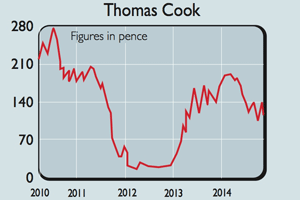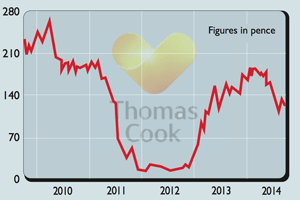Tips update: Thomas Cook
Harriet Green's departure from Thomas Cook has rattled investors in the travel operator. But should it have, asks Phil Oakley.
Get the latest financial news, insights and expert analysis from our award-winning MoneyWeek team, to help you understand what really matters when it comes to your finances.
You are now subscribed
Your newsletter sign-up was successful
Want to add more newsletters?

Twice daily
MoneyWeek
Get the latest financial news, insights and expert analysis from our award-winning MoneyWeek team, to help you understand what really matters when it comes to your finances.

Four times a week
Look After My Bills
Sign up to our free money-saving newsletter, filled with the latest news and expert advice to help you find the best tips and deals for managing your bills. Start saving today!
If there's one thing the stockmarket hates more than anything else, it's the unexpected. So when travel operator Thomas Cook (LSE: TCG)announced last week that its chief executive, Harriet Green, was stepping down with immediate effect, shocked investors decided to dump the shares. They fell by nearly 20% last Wednesday.
However, while Green's departure was the headline-grabber, it's just as likely that investors were spooked by the more downbeat outlook on current trading that was also announced by the company.
Investors could be forgiven for wondering whether Green was jumping ship before things turned sour, as many other CEOs have done before her.
MoneyWeek
Subscribe to MoneyWeek today and get your first six magazine issues absolutely FREE

Sign up to Money Morning
Don't miss the latest investment and personal finances news, market analysis, plus money-saving tips with our free twice-daily newsletter
Don't miss the latest investment and personal finances news, market analysis, plus money-saving tips with our free twice-daily newsletter
To tell the truth, I think investors have overreacted. There's no doubt that Green has done a fabulous job in reviving Thomas Cook from near disaster just over two years ago.
When she took over the reins, the company was in dire straits and the shares were just 14p each. A fresh strategy and the slashing of hundreds of millions in costs have restored the company to health.
But is her departure the disaster the share-price reaction implied? I think not. As a company, Thomas Cook is undoubtedly more than just Harriet Green.
The new man in charge, Peter Frankhauser, is hardly a travel industry novice. He has a lot more industry experience than Green, with 20 years in the trade. He reputedly did a very good job running the European business of rival Kuoni. He may actually be a better choice to take the company forward.

The first part of the cost-savings plan has beaten expectations, saving £500m rather than the £460m originally expected. Cash generation is expected to remain impressive, as net debt is set to fall from £326m to £100m-£150m next year. All of this suggests to me that the intrinsic value of the company is continuing to increase.
I tipped the shares at 118p back in early October. They are now back to around that level.
On last year's trading profits of £323m which look like being higher next year and current net borrowings of £326m, the company has an earnings before interest and tax (EBIT) yield of 15.8%. Despite the ups and downs that travel operators will undoubtedly experience, that looks too cheap to me. The shares still look worth buying.
Verdict: buy
Get the latest financial news, insights and expert analysis from our award-winning MoneyWeek team, to help you understand what really matters when it comes to your finances.
Phil spent 13 years as an investment analyst for both stockbroking and fund management companies.
-
 ISA fund and trust picks for every type of investor – which could work for you?
ISA fund and trust picks for every type of investor – which could work for you?Whether you’re an ISA investor seeking reliable returns, looking to add a bit more risk to your portfolio or are new to investing, MoneyWeek asked the experts for funds and investment trusts you could consider in 2026
-
 The most popular fund sectors of 2025 as investor outflows continue
The most popular fund sectors of 2025 as investor outflows continueIt was another difficult year for fund inflows but there are signs that investors are returning to the financial markets
-
 Why Thomas Cook collapsed
Why Thomas Cook collapsedFeatures Thomas Cook has gone bust, leaving stakeholders, politicians and managers all blaming each other.
-
 What investors can learn from Thomas Cook's collapse
What investors can learn from Thomas Cook's collapseFeatures Bad decisions and bad debt have led to the collapse of 178-year-old travel company Thomas Cook. John Stepek looks at what investors can learn from its demise.
-
 Thomas Cook’s holiday nightmare
Thomas Cook’s holiday nightmareFeatures High debt, fierce competition and one-off factors have pushed tour operator Thomas Cook to the brink of bankruptcy.
-
Share tips of the week
Features MoneyWeek’s comprehensive guide to the best of this week’s share tips from the rest of the UK's financial pages.
-
 Will Fosun rescue Thomas Cook?
Will Fosun rescue Thomas Cook?Features China’s Fosun International is considering bidding for beleaguered British travel company Thomas Cook’s tour operating division.
-
 Shares in focus: Should you take a trip with Thomas Cook?
Shares in focus: Should you take a trip with Thomas Cook?Features Package-holiday provider Thomas Cook has done a good job of turning itself around. So, is it time to get back on board? Phil Oakley investigates.